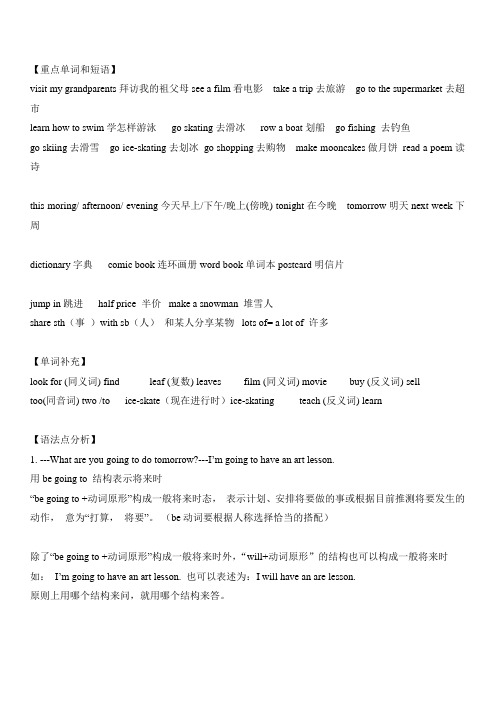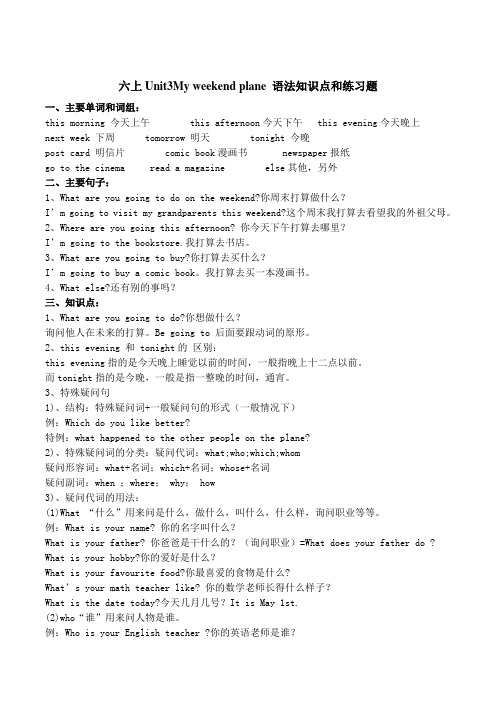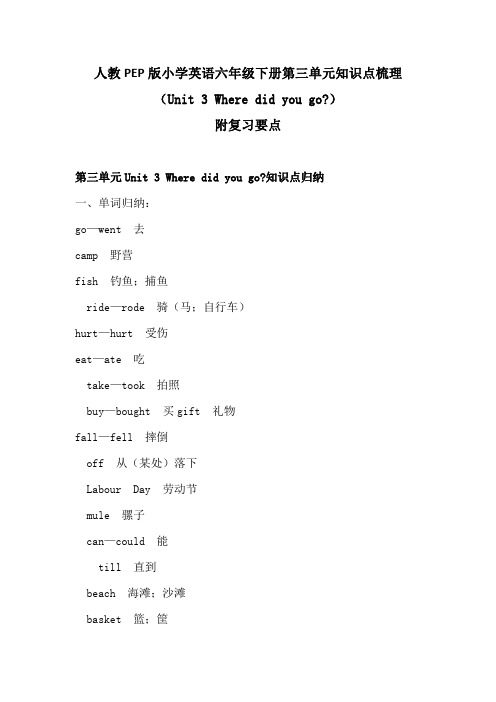人教版六年级英语第三单元知识点归纳和易错题整理
人教版六年级英语第三单元知识点归纳和易错题整理备课讲稿

【重点单词和短语】visit my grandparents拜访我的祖父母 see a film看电影take a trip去旅游go to the supermarket去超市learn how to swim学怎样游泳go skating去滑冰row a boat划船go fishing 去钓鱼go skiing去滑雪go ice-skating去划冰go shopping去购物make mooncakes做月饼read a poem读诗this moring/ afternoon/ evening今天早上/下午/晚上(傍晚) tonight在今晚tomorrow明天next week下周dictionary字典comic book连环画册word book单词本postcard明信片jump in跳进half price 半价make a snowman 堆雪人share sth(事)with sb(人)和某人分享某物lots of= a lot of 许多【单词补充】look for (同义词) find leaf (复数) leaves film (同义词) movie buy (反义词) selltoo(同音词) two /to ice-skate(现在进行时)ice-skating teach (反义词) learn【语法点分析】1. ---What are you going to do tomorrow?---I’m going to have an art lesson.用be going to 结构表示将来时“be goi ng to +动词原形”构成一般将来时态,表示计划、安排将要做的事或根据目前推测将要发生的动作,意为“打算,将要”。
(be动词要根据人称选择恰当的搭配)除了“be going to +动词原形”构成一般将来时外,“will+动词原形”的结构也可以构成一般将来时如:I’m going to have an art lesson.也可以表述为:I will have an are lesson.原则上用哪个结构来问,就用哪个结构来答。
人教新起点英语六年级上册Unit3知识点汇总

新起点(一起)六年级Unit3 知识汇总
一、词汇:
名词:reptile(爬行动物) bird(鸟) fish(鱼) shark(鲨鱼) insect(昆虫) penguin(企鹅) whale(鲸) peanut(花生) kind(种类) mammal(哺乳动物) fan(扇子) tusk(长) metre(米) trunk(象鼻) Asia(亚洲) Africa(非洲)其他:spend(花费) smart(聪明的)
二、习惯搭配:
every night每晚
a lot of许多;大量
a guide dog导盲犬
lay eggs产蛋卵
be covered with覆盖着
cross the street过马路
welcome to... 欢迎来到…
on fire着火
三、重点句型:
1如何询问“某人喜欢什么动物”的句型:
What animals do you like?
-I like+动物复数
eg: -What animals do you like?
-I like pandas.
2如何询问“某种动物是什么种类”的句型
What kind of animals are+动物复数?-They are+动物类型eg:-What kind of animals are monkeys?
-They are mammals.。
6年级英语上册第三单元

人教版六年级英语上册第三单元知识点一、重点词汇解析1.visit /ˈvɪzɪt/:拜访;参观-例句:I will visit my grandparents this weekend.(我这个周末要去看望我的祖父母。
)-用法:visit + 人/地点,表示去拜访某人或参观某地。
2.film /fɪlm/:电影-例句:Let's go to see a film tonight.(今晚我们去看电影吧。
)-短语:see a film(看电影)。
3.trip /trɪp/:旅行-例句:We had a wonderful trip last summer.(去年夏天我们有一次很棒的旅行。
)-短语:take a trip(去旅行)。
4.supermarket /ˈsuːpəmɑːkɪt/:超市-例句:I often go shopping at the supermarket.(我经常在超市购物。
)-记忆方法:super(超级)+ market(市场),即超级大的市场。
5.evening /ˈiːvnɪŋ/:晚上;傍晚-例句:I usually do my homework in the evening.(我通常在晚上做作业。
)-短语:in the evening(在晚上)。
6.tonight /təˈnaɪt/:在今晚-例句:What are you going to do tonight?(你今晚打算做什么?)7.tomorrow /təˈmɒrəʊ/:明天-例句:I will go to school tomorrow.(我明天要去上学。
)8.dictionary /ˈdɪkʃənəri/:词典-例句:I need a dictionary to look up new words.(我需要一本词典来查新单词。
)ic book /ˈkɒmɪk bʊk/:漫画书-例句:I like reading comic books.(我喜欢看漫画书。
人教版六年级英语上册第三单元知识点归纳(飞)

六上Unit3My weekend plane 语法知识点和练习题一、主要单词和词组:this morning 今天上午 this afternoon今天下午 this evening今天晚上next week 下周 tomorrow 明天 tonight 今晚post card 明信片 comic book漫画书 newspaper报纸go to the cinema read a magazine else其他,另外二、主要句子:1、What are you going to do on the weekend?你周末打算做什么?I’m going to visit my grandparents this weekend?这个周末我打算去看望我的外祖父母。
2、Where are you going this afternoon? 你今天下午打算去哪里?I’m going to the bookstore.我打算去书店。
3、What are you going to buy?你打算去买什么?I’m going to buy a comic book。
我打算去买一本漫画书。
4、What else?还有别的事吗?三、知识点:1、What are you going to do?你想做什么?询问他人在未来的打算。
Be going to 后面要跟动词的原形。
2、this evening 和 tonight的区别:this evening指的是今天晚上睡觉以前的时间,一般指晚上十二点以前。
而tonight指的是今晚,一般是指一整晚的时间,通宵。
3、特殊疑问句1)、结构:特殊疑问词+一般疑问句的形式(一般情况下)例:Which do you like better?特例:what happened to the other people on the plane?2)、特殊疑问词的分类:疑问代词:what;who;which;whom疑问形容词:what+名词;which+名词;whose+名词疑问副词:when ;where; why; how3)、疑问代词的用法:(1)What “什么”用来问是什么,做什么,叫什么,什么样,询问职业等等。
2020人教PEP版英语六年级下册第三单元知识点梳理 附复习要点 Unit3 Where did you go

fall off—fell off 从(某处)落下摔倒 hurt my foot 我的脚受伤 eat fresh food—ate fresh food 吃新鲜的食物
Байду номын сангаас
二、句子归纳:
1
、
What
happened
?
—
— I fell off my bike and hurt my foot.
怎么了?我从自行车上摔下来,并且弄伤了我的脚。
5、Did you go to Turpan ?——Yes ,we did .你们去吐 鲁番了吗?是的,我们去了。 6 、 How did you go there ? — — We went there by plane . 你 们 怎 么 去 的 ? 我 们 坐 飞 机 去 的。
应该掌握的知识点:常见的不规则动词过去式:
My uncle was a driver ten years ago. 我叔叔十年 前是一名司机。 四、 了解句型
They won’t be ready till August. 它们直到八月份才成熟。 解读: 此句是一般将来时的否定句, they won’t=they will not。
人教版六年级上册英语第三单元知识点总结

第三单元知识点总结在人教版六年级上册英语课程中,第三单元是一个重要的学习阶段,主要内容涉及到“我的家乡”这一主题。
通过学习这个单元,学生可以了解家乡的风土人情,培养对家乡的热爱和自豪感,同时也能学习一些有关方位、地点和介绍自己家乡的表达方式。
下面将对这些知识点进行总结,以便学生在复习时能够更加深入地理解和掌握。
1. 方位介词的用法在本单元中,我们学习了几个常用的方位介词,如in、on、under、behind等。
这些介词在描述家乡的地理位置时十分重要,学生需要学会正确地运用它们,例如描述家乡的自然风景或者家中物品的位置等。
2. 询问和表达地点学生通过学习课文和课堂练习,可以掌握一些常用的询问和表达地点的句型,比如“What’s in the picture?”、“Where is…?”等。
这些句型能够帮助学生更好地表达自己的思想和理解他人的意思。
3. 描述家乡学生在本单元还学习了一些描述家乡的词汇和句型,例如“This is the….”、“There is a….”等。
通过这些词汇和句型的学习,学生可以更好地表达对家乡的认识和感受,展示出家乡的美丽和魅力。
总结回顾在本单元的学习中,学生通过了解方位介词的用法、询问和表达地点以及描述家乡等内容,可以更好地表达自己对家乡的认识和感受,增强对家乡的热爱和自豪感。
这些知识也为学生以后学习更加复杂的英语语法和表达提供了基础。
希望学生在复习时能够认真总结这些内容,使得知识更加深入和灵活。
个人观点我认为学生在学习英语的过程中,了解家乡这一主题不仅可以提高他们的语言表达能力,同时也能培养他们对家乡的热爱和认同感。
我觉得教材安排的这一单元内容非常有意义,对学生的成长和发展起着积极的推动作用。
希望我的文章能够帮助您更好地理解和掌握人教版六年级上册英语第三单元的知识点。
在第三单元的学习过程中,学生除了了解家乡的位置和描述家乡的方式之外,还需要学会如何描述家乡的风土人情和特色。
人教PEP版六年级上册Unit 3单元重难点归纳
单元重难点Unit 3 My weekend plan一、请背诵以下的单词和短语。
1. visit 拜访2. film电影3. trip 旅行4. supermarket超市5. evening晚上;傍晚6. tonight在今晚7. tomorrow 明天 8. dictionary词典 9. comic 滑稽的10. word单词 11. postcard明信片12. see a film看电影 13. take a trip去旅行 14. next week下周15. comic book (儿童的)连环画册16. word book单词书二、请朗读以下的单词和短语,并记住它们的中文意思。
1. lesson课2. space太空3. travel ( 尤指长途)旅行4. half一半5. price价格6. together一起7. mooncake月饼 8. poem诗 9. moon月亮10. Mid-Autumn Festival中秋节 11. get together聚会1. A: What are you going to do tomorrow / tonight / ...(询问某人打算做什么的句型)B: I'm / We're going to ...2. A: What are they going to do tomorrow / tonight/ ...B: They're going to ..3. A: What is he / she going to do tomorrow / tonight / ... B:He/Sheisgoingto...4. A: Where are you going?B: I am going to ... / We are going to the cinema/ hospital/ ...三、请熟记以下句型。
最新PEP人教版英语六年级上册第三单元知识总结
Unit3 My weekend plan单元剖析:本单元学习的主题是周末活动计划。
重点要掌握一般将来时be going to的表达方法以及三个核心句型。
还有牢记并运用表示将来的时间状语和一些短语。
1.询问对方打算做什么句型What are you going to do tomorrow?你明天打算做什么?I going to have an art lesson.我打算上美术课。
解析:本句句型结构为:What are you going to do +表示将来时间的词语?用于询问对方打算做什么。
答语:I’m / We’re going to+动词原形(+其他)be going to 表示“计划;打算”,是一般将来时的一种表达方式,常与表示将来的时间状语连用,与动词搭配时,动词用原形。
2.询问对方打算去哪句型Where are you going?你打算去哪儿?We are going to the cinema.我们打算去电影院。
解析:本句句型结构为:Where are you going(+表示将来时间的词语)用于询问对方打算去哪儿?答语为:I am/We are going (to)+地点。
例如:Where are you going?你打算去哪儿?I’m going to the park.我打算去公园。
3.询问对方打算何时去(做某事)句型When are you going?你们打算什么时候去?Next Wednesday. 下周三。
解析:本句句型结构为:When are you going(+其他)用于询问对方打算何时去(做某事),答语:将来时间。
例如:When are you going to see a film?你打算什么时候看电影?Next Sunday.下周日。
4.询问对方有没有某物句型Do you have comic books?你有连环画册吗?Yes!有!解析:本句句型结构为:Do you have +某物?用于询问对方有没有某物,do在这里是助动词无任何词义,have在这里意为“有,拥有”。
人教PEP版小学英语六年级上册Unit3重点易错汇总
人教PEP版小学英语六年级上册Unit 3 My weekend plan错题展示:一、汉译英,英译汉。
1. 自然公园 natur park2. 看一看look for3. 看一场电影 see film4. comic book 画册5. 明天 today6.今夜evening7. 不得不must8.洗衣服 wash cloth9. 去野炊 go a picnic 10.堆雪人 snowman 11.去超市 go to supermarket12.做家庭作业do work 13.画画 draw picture纠错解析:1.单词natur 拼写错误,应该是nature“自然”。
2.短语混淆,look for是“寻找”,look at “看一看”。
3.“看一场电影”see film,丢掉了中间的冠词a。
4.短语的中文意思记忆有误,comic book 表示连环画册。
5.短语的中文意思记忆有误,today表示“今天”, tomorrow表示“明天”。
6.英语单词混淆,evening表示“晚上” ,tonight表示“今夜”。
7.“不得不”是强调客观上的“必须”用have,而must“必须”强调主观上“必须”。
8.wash cloth 单词拼写错误,应该是clothes“衣服”。
9.go a picnic丢掉了for 或on,答案有两种情况go on a picnic 或go for a picnic。
10.答案snowman前面少了动词make,snowman是可数名词前面要加冠词a。
11.go to supermarket,名词supermarket前少了定冠词the。
12.work 表示“工作”,家庭作业用homework表示。
13. draw picture ,picture前丢掉了冠词a。
正确答案:1.nature park2.look at3.see a film4.连环画册5. tomorrow6.tonight7.have to8.wash clothes9.go for a picnic或者go on a picnic 10.make a snowman 11. go to the supermarket 12.do homework13.draw a picture二、英译汉:1. Mike is going to see a film.麦克去看电影。
人教版六年级英语第三单元知识点归纳和易错题整理
【重点单词和短语】visit my grandparents拜访我的祖父母 see a film看电影take a trip去旅游go to the supermarket去超市learn how to swim学怎样游泳go skating去滑冰row a boat划船go fishing 去钓鱼go skiing去滑雪go ice-skating去划冰go shopping去购物make mooncakes做月饼read a poem读诗this moring/ afternoon/ evening今天早上/下午/晚上(傍晚) tonight在今晚tomorrow明天next week下周dictionary字典comic book连环画册word book单词本postcard明信片jump in跳进half price 半价make a snowman 堆雪人share sth(事)with sb(人)和某人分享某物lots of= a lot of 许多【单词补充】look for (同义词)find leaf (复数)leaves film (同义词)movie buy (反义词) sell too(同音词)two /to ice-skate(现在进行时)ice-skating teach (反义词)learn【语法点分析】1. —--What are you going to do tomorrow?---I'm going to have an art lesson.用be going to 结构表示将来时“be goi ng to +动词原形”构成一般将来时态,表示计划、安排将要做的事或根据目前推测将要发生的动作, 意为“打算,将要”.(be动词要根据人称选择恰当的搭配)除了“be going to +动词原形”构成一般将来时外,“will+动词原形"的结构也可以构成一般将来时如:I’m going to have an art lesson.也可以表述为:I will have an are lesson。
- 1、下载文档前请自行甄别文档内容的完整性,平台不提供额外的编辑、内容补充、找答案等附加服务。
- 2、"仅部分预览"的文档,不可在线预览部分如存在完整性等问题,可反馈申请退款(可完整预览的文档不适用该条件!)。
- 3、如文档侵犯您的权益,请联系客服反馈,我们会尽快为您处理(人工客服工作时间:9:00-18:30)。
【重点单词和短语】visit my grandparents拜访我的祖父母 see a film看电影take a trip去旅游go to the supermarket去超市learn how to swim学怎样游泳go skating去滑冰row a boat划船go fishing 去钓鱼go skiing去滑雪go ice-skating去划冰go shopping去购物make mooncakes做月饼read a poem读诗this moring/ afternoon/ evening今天早上/下午/晚上(傍晚) tonight在今晚tomorrow明天next week下周dictionary字典comic book连环画册word book单词本postcard明信片jump in跳进half price 半价make a snowman 堆雪人share sth(事)with sb(人)和某人分享某物lots of= a lot of 许多【单词补充】look for (同义词) find leaf (复数) leaves film (同义词) movie buy (反义词) selltoo(同音词) two /to ice-skate(现在进行时)ice-skating teach (反义词) learn【语法点分析】1. ---What are you going to do tomorrow?---I’m going to have an art lesson.用be going to 结构表示将来时“be goi ng to +动词原形”构成一般将来时态,表示计划、安排将要做的事或根据目前推测将要发生的动作,意为“打算,将要”。
(be动词要根据人称选择恰当的搭配)除了“be going to +动词原形”构成一般将来时外,“will+动词原形”的结构也可以构成一般将来时如:I’m going to have an art lesson.也可以表述为:I will have an are lesson.原则上用哪个结构来问,就用哪个结构来答。
若句子中含有形容词,则句式应该为“be going t o be+形容词”或“will be+形容词”如:I am going to be free tomorrow. 或I will be free tomorrow.一般将来时的时间特征:evening晚上,傍晚tonight在今晚tomorrow明天next week下周thisafternoon今天下午this evening 今天晚上this weekend 下周末同步练习:一.选择填空( ) ①. Charlie ________ here next month.A. is going to workingB. is going to workC. are going to workD. am going to work( ) ②. –________ you ________ free tomorrow? – No. I ________ free the day after tomorrow.A. Are; going to; willB. Are; going to be; am going toC. Are; going to; will beD. Are; going to be; am going to be( ) ③. Mother ________ me a nice present on my next birthday.A. will givesB. will giveC. givesD. give( ) ④. He ________ very busy this week, he ________ free next week.A. will be; isB. is; isC. will be; will beD. is; will be( ) ⑤. The day after tomorrow they ________ a football match.A. will watchingB. watchesC. is watchingD. is going to watch二.根据句子后面的时态提示词改写句子。
①. China is a modern and strong country.(in twenty years)②. Tom gets up early every morning. (tomorrow moning)③. We go to the park by the No. 13 bus. (next weekend)2. We are going to draw some pictures in Renmin Park.此句是be going to 结构的肯定句式。
基本结构为:主语+ be going to +动词原形+表示将来的时间。
将来时的句子改否定句,只需在be或will 的后面直接加not即可,will not的缩写形式为won’t同步练习:把下面句子改为否定句②. My sister is going to visit my grandparens this weekend.若要把一般将来时的句子改为一般疑问句,则只需把在be或will提前到句首即可同步练习:把下面句子改为一般疑问句并作肯定和否定回答②. My sister is going to visit my grandparens this weekend.3. ---Where are you going?---We’re going to the cinema.此句是where 引导的一般将来时态的特殊疑问句,where意为“哪里”,它是对地点提问的特殊疑问词,因此回答时要回答一个具体的地点。
同步练习:就划线部分提问①. I am going to the park to go fishing with my classmates.②. Amy is going to Sanya this her summer holiday.③. They will have a Christmas Party at my home this year.4. ---When are you going?---Next Monday.此句中when意为“什么时候,何时”,它引导的疑问句用来对年、月、日等时间进行提问。
如:---When do you go to school in the morning?---At 8:00.同步练习:就划线部分提问①.We are going to have a text this afternoon.②.5. ---How can you learn to swim without going to a pool?此句是由how 引导的特殊疑问句,询问别人做事的方式、方法,也可以问交通出行方式。
句中的can意为“能够”,是情态动词,后面跟动词原形。
而without为介词,则后面用了going ,介词后面用动词的ing形式同步练习:就划线部分提问【强化练习】()1. The day after tomorrow they ________ a football match.A. will watchingB. watchesC. is watchingD. are going to watch ()2. They ________ an English evening next Sunday.A. are havingB. are going to haveC. will havingD. is going to have()3. – Will his parents go to see the film tomorrow? – No, ________.A. they willn’t.B. they won’t.C. they aren’t.D. they don’t.4. Today is a sunny day. We __________ (have) a picnic this afternoon.5. My brother _______________ (go) to Shanghai next week.6. Tom often _________(go) to school on foot. But today is rainy. He________(go) to school by bike.7. What do you usually do at weekends? I usually ________ (watch) TV and __________(play) football .8. It’s Friday today. What _____she _________ (do) this weekend? She _____________ (watch) TV .9. A: What you (do )next Sunday? B: I (go) to see a film .【作文:向大家介绍一下你一家人下周末的周末计划】例文:My family will have a busy weekend. I am going to the bookstore to buy some books. My parents are going to visit my grandparents. My sister is going to the park to draw some pictures with her friends. We will have a good time.【一般将来时小测】一.按要求完成句子1. Nancy is going to go swimming.(改否定)Nancy ________ going to go swimming.2. I’ll go with me.(改否定) I _______ go with me.3. I’m going to get up at 6:30 tomorrow.(改一般疑问句) _______ _____ ______ to get up at 6:30 tomorrow?4. We will meet at the bus station at 10:30.(改一般疑问句) _______ ________ meet at the bus stop at 10:30 ?5. She is going to listen to music after school.(就划线部分提问)______ ______ she ________ ________ _________ after school?6. My father and mother are going to see a play tomorrow.(就划线部分提问)_______ ________ going to see a play tomorrow ?7. We will do our homework at 10:30.(改一般疑问句)_______ ________ do ______ homework at 10:30 ?(用另一种表达) We ______ _______ ______ do our homework at 10:30 .8.The students have a trip on Sunday.用next Sunday改写9.Linda has lunch at school on Tuesdays.用next Tuesday改写二.选择填空( ) 1.Charlie ________ here next month.A. isn’t workingB. doesn’t workingC. isn’t going to workingD. won’t work ( ) 2.–Where are you going this summer holiday? – I ________ visit BeijingA. will going toB. will goesC. am going toD. is going to( ) 3. He ________ in three days. A. coming back B. came back C. will come back( ) 4. The day after tomorrow they ________ a football match.A. will watchingB. watchesC. is watchingD. are going to watch ( ) 5.The weather___ very cold tomorrow. A. is B. am going to be C. will be D. will is ( ) 6. He ______ to us as soon as he gets there. A. writes B. is writing C. will write D. wrote ( ) 7. Tomorrow he ________ a kite in the open air first, and then ________ boating in the park.A. will fly; will goB. will fly; goesC. is going to fly; will goesD. flies; will go ( ) 8. ________ your brother ________ a magazine from the library?A. Are; going to borrowB. Is; going to borrowC. Will; borrowsD. Are; going to borrows【常错语法点归纳】( ) 1. He is going to the bookstore this afternoon. A. in B. on C. at D. / ( ) 2. My father will go to Shanghai next week. A. in B. on C. at D. / ( ) 3. I am going to the cinema a film.A. seeB. to seeC. watchD. to watch ( ) 4. Tom is going to this year.A. nineB. be nineC. ninthD. be ninth( ) 5. Our classroom is on floor.A. secondB. the secondC. twoD. the two( ) 6. My mother free tomorrow. She a cake for me.A. is going to, is going to makeB. is going to be, is going to makingC. is going to be, is going to makeD. will be, will be make( ) 7. I a maths teacher in the future.A. want beB. beC. want toD. want to be( ) 8. are you going this weekend? The Renming Park.A. WhenB. HowC. WhatD. Where( ) 9. will you go to Beijing next month? I will go ther by plane.A. WhenB. HowC. WhatD. Where( ) 10. is your mother go to the supermarket? Tomorrow morning?A. WhenB. HowC. WhatD. Where11. It’s going to rain tomorrow. (写出两句同义句)12. What are you going to do in the future? (按实际情况回答)13. Amy is going to the hospital to see a doctor this weekend. (写出同义句)14. She has Chinese class every day. (根据时间状语提示,改写句子,注意句子的时态)(用now改写)(用this Friday改写)15. I’m going to visit my grandparents.(对划线部分提问)______________________ _16. Mr White is going to see a film with his wife on Sunday evening.(就划线部分提问)。
